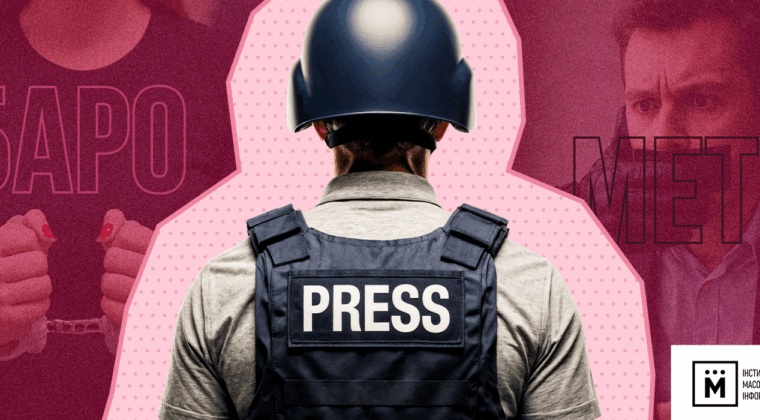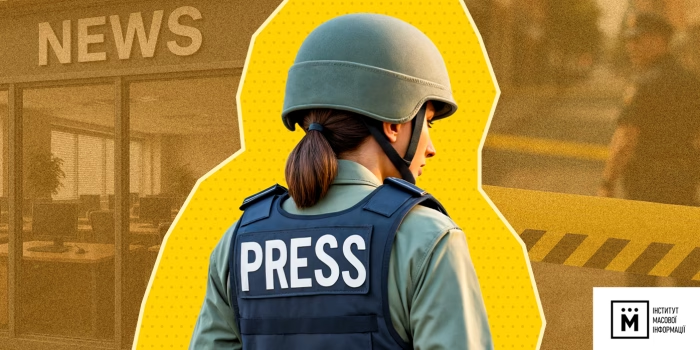Margarita Simonyan is one of Russian propaganda’s key figures. She is the head of the Kremlin-controlled multilingual TV network RT (formerly Russia Today), whose content primarily targets foreign audiences and the Russian diaspora abroad. After the start of Russia’s full-scale invasion of Ukraine, the RT network has been sanctioned for spreading disinformation: it is forbidden to broadcast the Kremlin’s propaganda lies in the EU, United Kingdom, and Canada.
In addition, these countries, as well as Switzerland and Australia, have imposed personal sanctions against Simonyan and her husband, Russian propagandist Tigran Кеоsayan. Keosayan is also banned from entering Kazakhstan. In turn, the editor-in-chief of RT has repeatedly claimed that she and her colleagues are simply doing journalists’ job and “do not serve any officials.” Decrying the supposed “censorship” in response to legal restrictions imposed on them by the international community has already become a kind of a tradition among the supporters of the Russian government. But why are such “arguments” brazen manipulation?
IMI is starting a series of publications about the info crimes committed by Russian propagandists, who in no way can be equated with journalists.
Who is Simonyan and how did she win the Kremlin’s favor?
Margarita Simonovna Simonyan was born April 6, 1980 in Krasnodar, RSFSR. She graduated from the Journalism Faculty of the Kuban State University in the same city. Simonyan’s propaganda career began in 2001 at the All-Russian State Television and Radio Company (VGTRK). She worked in the Russian president’s pool, and in 2004 she gained “fame” for her distorted coverage of the Beslan terrorist attack. Simonyan did not report on the terrorists’ promise to release the hostages if Russian troops withdraw from Chechnya and understated the number of hostages. A year after making such “efforts” Margarita was appointed editor-in-chief of RT – a propaganda resource, which has been among the leaders in state fuding among all Kremlin “tanks” since being founded in 2005 and until 2022.
In Russia’s federal budget for 2022, the funding for RT has been increased, 28.7 billion rubles being allocated to it. The RT can not be called a mass media, just like Simonyan can not be called a journalist, for a number of reasons. First of all, RT does not adhere to journalistic standards and produces a huge amount of fakes. After the start of Russia’s full-scale invasion of Ukraine, the propagandists launched a series of disinformation films they call “documentaries.” Namely, RT employees lie about the Russian military’s actions in Mariupol. Simonyan herself claims that the war crimes were committed not by Russian soldiers, but by the Ukrainian special forces unit “Azov.” Secondly, RT’s status is worth paying attention to. Namely, the Russian Federation’s state commission for increasing the sustainability of the Russian economy’s development included the propaganda TV company in the list of key organizations of strategic importance for Russia. And, thirdly, the Simonyan herself does not hide that her media company serves the Kremlin. RT defines its mission as “reflecting Russia’s position on the main issues of international politics.” This in itself goes against the journalistic standard of maintaining a balance of opinions. That is, the resource actually directly says that it is a mouthpiece for the Kremlin. Moreover, in 2012, Simonyan herself admitted in one of her interviews that RT cooperates with the Ministry of Defense of the Russian Federation:
“The Ministry of Defense was at war with Georgia, and we were waging an information war, and with the entire Western world at that. Well, you can’t just start making weapons when the war has already begun! Therefore, the Ministry of Defense is not at war with anyone now, but is ready for defense. So are we.”
To keep up with answering why Simonyan is not a journalist, it is also worth noting that she advocated for removing the prohibition of censorship from Russia’s constitution:
“A large state cannot exist without control over information. And they, those who forced us to write in our Constitution that censorship is prohibited, understand this very well.”
In addition to RT, Simonyan is the editor-in-chief of the Kremlin news agencies Russia Today and Sputnik. Margarita Simonyan has received numerous state awards. In particular, she has been awarded the Order of Merit to the Motherland by the Russian authorities for her so-called “objectivity” in covering the events that unfolded during the Russian occupation of Crimea, as well as the Order of Alexander Nevsky, which is a Russian award customarily given to state officials for special achievements in serving the motherland. With such a “service record,” it is not surprising that Russian President Putin addresses Simonyan with the informal form of “you,” while she always calls him “Chief” on social media (always capitalized. – Ed.).
Film propaganda. “A Kingdom” for “the Crimean Bridge”
Simonyan’s propaganda work is not limited to television and quasi-documentaries. In 2018, she wrote and produced the movie “Crimean Bridge. Made with Love” about the construction of the bridge between the Russian mainland and Russian occupied Crimea. The film was shot by Simonyan’s husband Keosayan. The film was presented to the Russian audience as supposedly “artistic,” but is in fact concentrated propaganda aimed at igniting the “krymnashism” spirit in Russians and justifying the Russian Federation’s criminal actions. Just look at this scene written by Simonyan:
“And how is life now that you’re in Russia?” “(In Ukrainian) Quite bad, thank you.” “These prices are hell!” “They brought in a whole train of prisoners to build a bridge, even going outside is scary!” “And what, was it better before? Before the annexation.” “What annexation?” “Well, before the Russians took Crimea.” “What are you talking about there?! What do you mean ‘took’?! Catch him! Saboteur!”
The State Film Fund of the Russian Federation allocated 100 million rubles for filming this, outside of the competition. In total, the couple of propagandists earned 45 million federal budget rubles with the film. However, the movie was a box office failure.
Extremist statements and the children of Donbas: how is the propagandist “shaking up” social media?
Simonyan’s social media are another tool in Russia’s hybrid war against Ukraine and the world. Over 487,000 people have subscribed to the propagandist’s main Telegram channel. She also runs two other Telegram accounts: the first, called “Margarita Simonyan From Home,” has over 50,000 subscribers, and the second, “Margarita Simonyan. Literature,” has over 23,000 subscribers. Simonyan’s Twitter follower count exceeds 540,000. The propagandist’s social media are a kind of noisy mixture of fakes and manipulations, which she generates herself or shares from various Kremlin resources (and which she advertises in her selections of “verified” sources every now and then), as well as threats to Ukraine’s national security and promotion of Russian narratives.
Despite the fact that Simonyan positions herself as a “journalist,” her social media, where she mostly posts her media products, rather than sharing, say, her personal life, are full of value judgments and even insults. Most of those are about the President of Ukraine, Volodymyr Zelensky. This is how Simonyan addressed the Ukrainian Commander-in-Chief on her main Telegram channel: “You are not just not-Russia, you are not human at all. You are a petal mine, you hypocrite scum. There is a special greenhouse for such petals in hell.”
Of course, one can always say that such “passages” are not an ethical violation, but simply a personal opinion, to which everyone is entitled, albeit expressed in a radical form. We do not rule out that Russian propagandists will also use this argument to their defense when international institutions start holding them accountable for inciting hatred. But then what is one to do with Simonyan’s obviously extremist statements?
https://t.me/margaritasimonyan/11853

The propagandist has repeatedly threatened Ukraine with nuclear weapons:
https://t.me/margaritasimonyan/11250
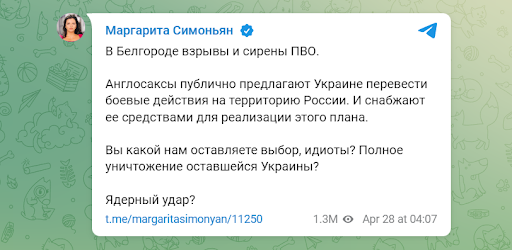
https://t.me/margaritasimonyan/12086
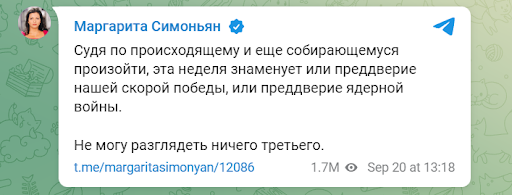
https://t.me/margaritasimonyan/12113
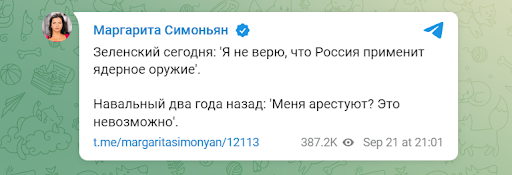
https://t.me/margaritasimonyan/12136
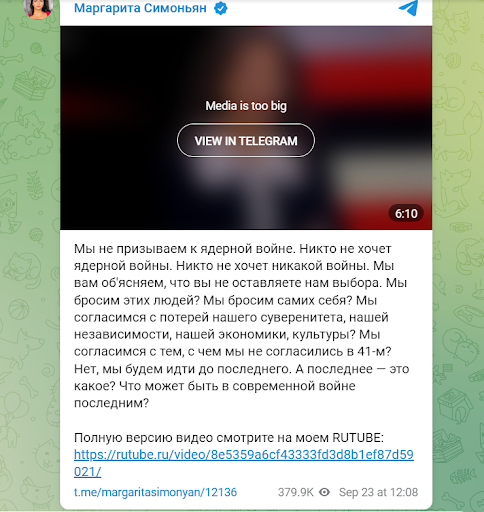
Simonyan poses a threat to Ukraine’s national security, as she has called for the annexation of Ukrainian territories:
https://t.me/margaritasimonyan/12077
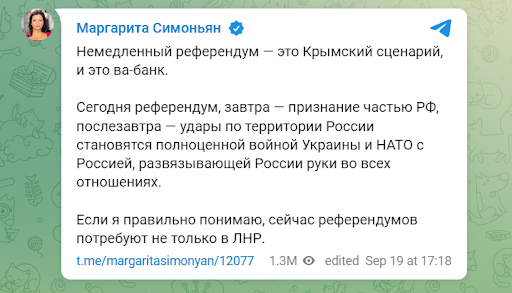
“An immediate referendum is the Crimean scenario, and it’s an all in move.”
https://t.me/margaritasimonyan/11612

She also calls into question the Ukrainian statehood as such:
https://t.me/margaritasimonyan/12002
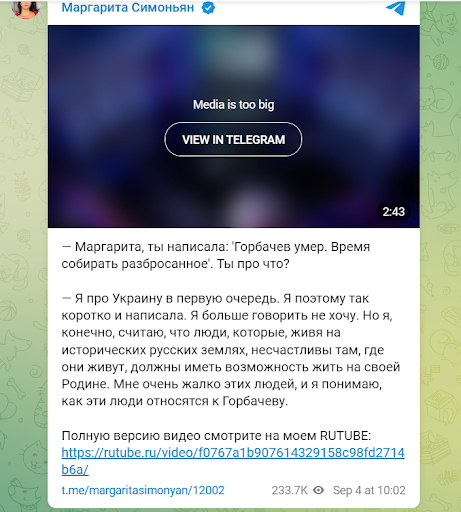
Simonyan’s social media are a continuous stream of fakes, which she usually spices up with stunning details, as befits a Russian propagandist. For example, she spreads baseless claims about the Ukrainian military allegedly torturing people:
https://t.me/margaritasimonyan/11450
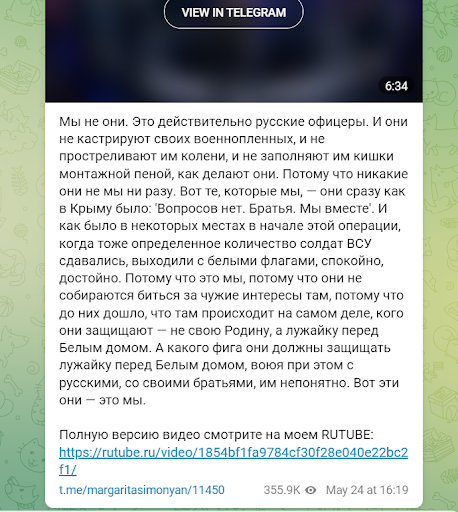
https://t.me/margaritasimonyan/11667
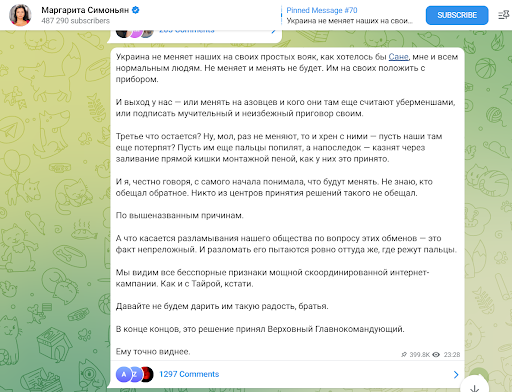
And, of course, she reposts propaganda movies about what is happening in Ukrainian cities which were occupied by Russia.
Simonyan regularly posts fakes, attributing the Russian army’s war crimes to the Ukrainian military. In particular, she wrote that the Mariupol Drama Theater and the Vinnytsia House of Officers had served as a temporary shelter for the Ukrainian military, which is why they were fired upon. We suggest you read the refutation by the VoxUkraine team. RT’s editor-in-chief has also repeatedly made manipulative claims about the Ukrainian military “hiding behind the civilian population.” This is a Kremlin narrative according to which the civilians in the Russian occupied territories and front-line cities are dying not because of the Russians’ actions, but because of the Ukrainian military placing their equipment next to civilian objects or in residential areas:
https://t.me/margaritasimonyan/11234
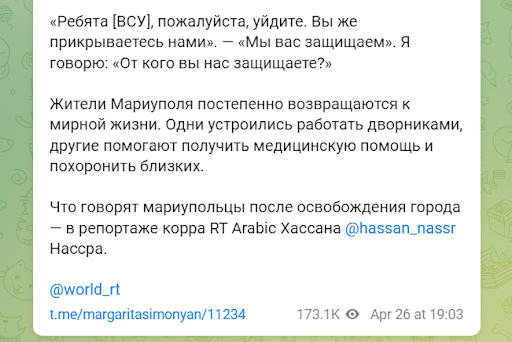
https://t.me/margaritasimonyan/11647
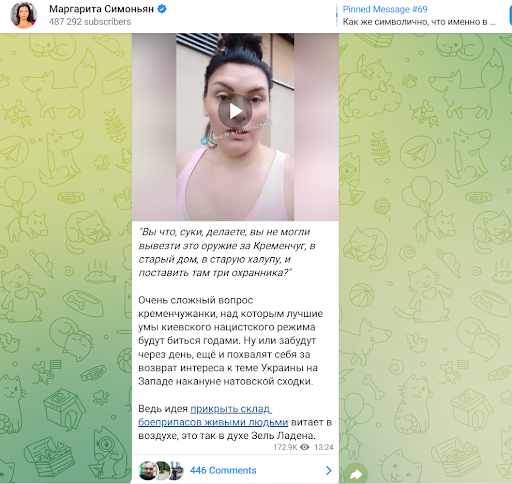
Her musings about the war supposedly ending as soon as the West stops giving weapons to Ukraine are the same story.
https://t.me/margaritasimonyan/12097
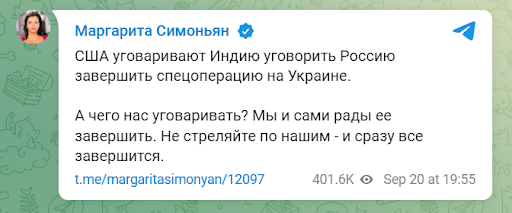
And, of course, while spreading her fakes and manipulations, Simonyan does not leave the children out. Namely, the children of the Donbas. The propagandist has repeatedly claimed that it was not Russia but Ukraine that started the war in the Donbas, along with the fifth Ukrainian president Petro Poroshenko, who allegedly personally threatened that “the children of the Donbas will be sitting in their basements.”
https://t.me/margaritasimonyan/11520
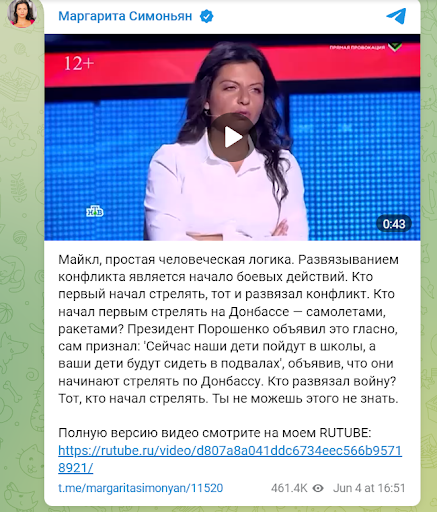
https://t.me/margaritasimonyan/11208
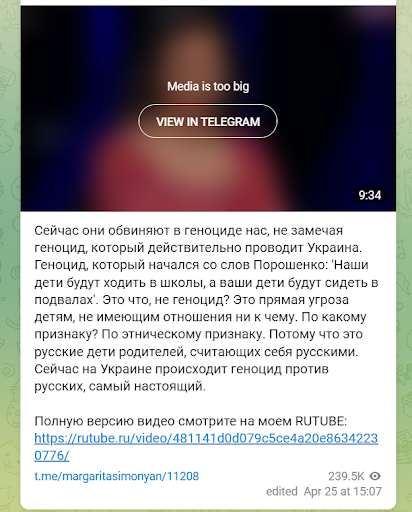
In fact, Poroshenko’s quote was taken out of context: the full text of Simonyan’s speech and the refutation of these fakes can be found on the StopFake website.
It is no exaggeration that the media activities of Russian propagandists are playing a key role in the war against Ukraine, and also contributed to the preparation for the full-scale invasion, influencing the spread of hostile attitudes towards Ukrainians in Russian society significantly. According to the Russian non-governmental sociological organization “Levada Center,” as of late August, 76% of Russians supported the Russian army’s actions in Ukraine. Since February 24, 2022, Russia has stepped up the censorship in their information space. Namely, the Prosecutor General’s Office of the Russian Federation has been granted the right to shut down media resources for disseminating information that discredits the Russian army (this includes, in particular, posting data on the war crimes committed by the Russian military), as well as for “calls for sanctions,” without turning to the court. Therefore, we believe that the work of Russian propagandists should be recognized as a threat to peace and an act of aggression – in accordance with Article 39 of the UN Charter.
Alyona Nesterenko, IMI media expert


